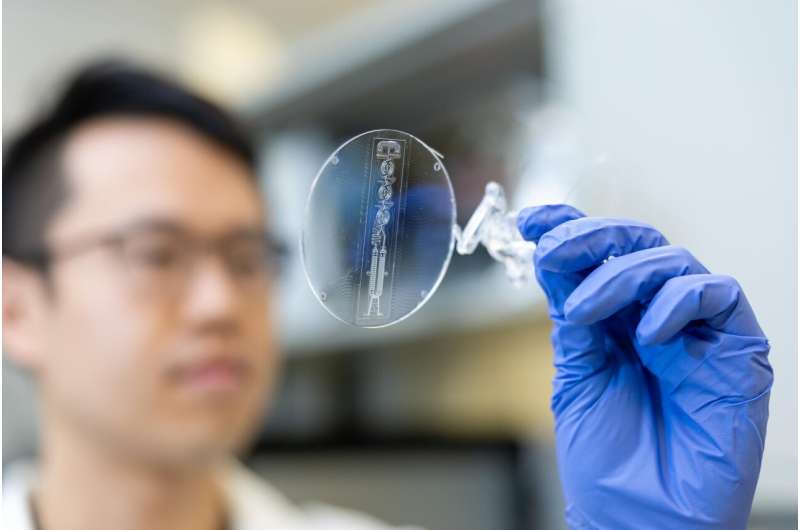University of Cincinnati engineers have created a new device to help doctors diagnose depression and anxiety.
UC College of Engineering and Applied Science Distinguished Research Professor Chong Ahn and his students developed a “lab-on-a-chip” device that measures the stress hormone cortisol from a patient’s saliva. Knowing if a patient has elevated stress hormones can provide useful diagnostic information even if patients do not report feelings of anxiety, stress or depression in a standard mental health questionnaire.
Mental health disorders affect more than 400 million people around the world. Stress disorders such as anxiety and depression are among the leading causes of disability worldwide. Prolonged cortisol elevation is linked to numerous mental health disorders, including depression and anxiety.
UC researchers created a lab-on-a-chip system to track a patient’s cortisol levels. It consists of a disposable collection device that a person puts in their mouth which is then inserted into a reader. The reader can transmit results in minutes to a portable analyzer and smartphone.
The study is published in the journal Biomedical Microdevices.
“We’re working on point-of-care testing, which allows patients to do testing at home or in a clinic. People don’t want to go to a lab to get invasive tests,” Ahn said. “Mental health care can be an urgent situation. And so these tests will help doctors make timely interventions.
“The system uses traditional psychometric evaluations in a questionnaire along with physiological biomarker measurements that provide evidence-based diagnostics. This approach has the potential to open a new realm of diagnostics for stress disorders.”
Patients can do the testing themselves and share results with doctors via smartphones, he said.

Early warnings
Study co-author UC doctoral student Supreeth Setty is working on a related project for his dissertation that examines another hormone (dehydroepiandrosterone) that goes by the acronym DHEA. That hormone helps to counteract the effects of too much cortisol in the body. Research has shown that high ratios of cortisol to DHEA are indicators of chronic stress associated with conditions such as depression and anxiety.
“When a patient comes in, they take blood samples. Normally it takes days to get lab results back,” Setty said. “But here the results are obtained in a few minutes using saliva, and it’s noninvasive.”
Setty said the tests provide clinicians with objective evidence to supplement traditional screenings such as the patient health questionnaire.
“Point-of-care testing is a practical way to make results available quickly for everyone,” he said.
Unlike mental health questionnaires that can be more subjective because they rely on a patient’s candor and self-awareness, the cortisol and DHEA tests are objective and can raise a red flag about a patient’s levels of stress, Setty said.
“The next step would be to collaborate with psychiatrists and conduct clinical trials to see if our platform works as expected,” Setty said.
UC doctoral graduate Vinitha Thiyagarajan Upaassana was the lead author of the study with Setty and co-author and UC doctoral student Heeyong Jang.

Other applications
UC researchers say their technique can be used to diagnose other health issues.
In particular, they examined troponin, a protein that gets released into the bloodstream when patients suffer damage to their hearts from conditions such as a heart attack. The amount of the protein released depends on how much damage the heart sustains. High cardiac troponin levels in combination with symptoms such as chest pain can indicate a heart attack in progress.
In a paper published in the journal Analytical Chemistry, Jang, Setty and Ahn unveiled an innovative new device for a rapid and effective point-of-care biochemical test that measures troponin from a drop of blood.
“Once you survive a heart attack there is an increased probability of having another heart attack,” Jang said. “We can monitor troponin in the blood on a daily basis and hopefully get valuable information. The test provides immediate results, which is important when a patient is in need of immediate care.”
UC researchers also developed a new point-of-care-testing platform for COVID-19. Researchers unveiled their new design in the journal Sensors and Diagnostics.
More information:
V. Thiyagarajan Upaassana et al, On-site analysis of cortisol in saliva based on microchannel lateral flow assay (mLFA) on polymer lab-on-a-chip (LOC), Biomedical Microdevices (2025). DOI: 10.1007/s10544-025-00733-6
Heeyeong Jang et al, A New Chemiluminescence-Based Rapid Diagnostic Testing Platform with Sequential Dual-Flow Strips for Cardiac Troponin I (cTnI), Analytical Chemistry (2025). DOI: 10.1021/acs.analchem.4c06427
Supreeth Setty et al, A new sequential dual flow lab-on-a-chip with a lyophilized one-component chemiluminescence substrate for high-sensitive microchannel lateral flow assay (mLFA), Sensors & Diagnostics (2025). DOI: 10.1039/D4SD00352G
Citation:
Lab-on-a-chip devices offer home tests for stress and cardiac issues (2025, May 8)
retrieved 8 May 2025
from https://medicalxpress.com/news/2025-05-lab-chip-devices-home-stress.html
This document is subject to copyright. Apart from any fair dealing for the purpose of private study or research, no
part may be reproduced without the written permission. The content is provided for information purposes only.

